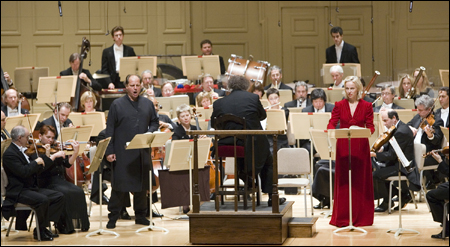
DUKE BLUEBEARD’S CASTLE: Demanding and haunting. |
What can be more exciting — or more unpredictable — than a live performance? Earlier this month the Boston Symphony Orchestra under James Levine played one piece twice, surrounding the Beethoven and Schoenberg violin concertos with repeat performances of Levine’s own string-orchestra arrangement of Beethoven’s monumental and monumentally challenging Grosse Fuge (the “Great Fugue,” Opus 133), originally the last movement of the Opus 130 string quartet. Hearing this a second time so illuminated — and was illuminated by — everything that had come before, I needed to hear the entire concert again.
But on Tuesday, something had gone awry. The Grosse Fuge had lost its focus. Crucial elements were missing: the progression of unfolding emotions from section to section, the way individual phrases were expressively shaped. Three dimensions had been flattened to one.
Then after the two concertos, the Grosse Fuge was back on target. Here was the moving, intense, shaped performance I had heard — twice — five days earlier. Why had the first Tuesday performance gone flat? Had the performers forgotten what they’d done after a lapse of several days, with no rehearsal in between? Was everyone just tired? (This has already been one of the most demanding BSO seasons in decades.) And did the first “run-through” energize rather than exhaust the players? Had they been reinspired by the thoughtful and astonishing Christian Tetzlaff’s playing of the two violin concertos?
A second hearing of the Schoenberg concerto also altered my view of that piece. I’d found it enjoyable to listen to but difficult to follow. Further acquaintance with any piece allows one to hear more easily how it fits together, however. On Thursday I’d felt a kind of carnival atmosphere; now I was struck by the heroic nature of this piece, how much larger in conception it was than I’d given it credit for, and therefore sadder, more moving, more powerful.
Or had the performance itself become more stirring?
The following week afforded the orchestra no respite. As if all the recent Schoenberg — some of it new to the BSO — weren’t demanding enough, the players had to deal with Béla Bartók’s early (1911) one-act opera Duke Bluebeard’s Castle, with its dazzling orchestrations mirroring the moody atmosphere of the Béla Balázs libretto, Bartók’s supersaturated color depicting the glittering treasury, fluttering garden, distant vistas (“silken meadows, velvet forests”), muted tears, and blood behind the duke’s locked doors. The players seemed to be having a field day. At times, it was hard to hear Anne Sofie von Otter (as Bluebeard’s latest wife, Judith) over the rich sound spectrum. Although she’s an intelligent, sensitive actress and vocalist, her voice doesn’t have the cutting edge this role requires. (No problem when she’s miked for a recording.) Bass-baritone Albert Dohmen, memorable in previous BSO Beethoven (Ninth Symphony) and Schoenberg (Gurrelieder), has precisely that kind of voice, a glinting surface radiating from an impenetrably dark timbre. Several reviewers criticized him for a certain inexpressivity. “If he envisioned the duke as an automaton, then he did a creditable job,” New York Sun critic Fred Kirshnit wrote about the Carnegie Hall performance. I thought Dohmen had, in fact, made a deliberate choice not to be melodramatic and found his restraint compelling, Bluebeard becoming increasingly passive as his inquisitive new wife insists on reopening his past.
No controversy, however, about the theatrical electricity generated by Hungarian actor Örs Kisfaludy wending his way through the orchestra as he recited the often omitted riddling Prologue (the music starts filtering in near the end of his speech), teasing us into picturing the action behind “the fringed curtain” of our eyelids.
I found the opera so haunting I didn’t want to hear anything else afterward, least of all Brahms’s First Symphony. But the tight, vigorous, forward-moving and forward-looking performance — by turns pounding, uncertain, stealthy, singing, and soaring — won me over. I’d already heard how much Bartók owed to Richard Strauss (especially Salome, composed six years before); now I was discovering how much the Brahms “owed” to Bartók (though Bluebeard arrived 35 years later).
Kirshnit thought the Brahms “dreadful,” “ragged,” and “discordant” (the odd word he used for John Ferrillo’s oboe solo, which I’d found especially beautiful here). I don’t know what, if anything, went wrong in New York. At a live performance, of course, anything could.
The chamber-opera group Intermezzo is in its fourth season and has already commissioned five new operas. The only one I’ve caught, Verlaine & Rimbaud, was ambitious but disappointing. But last year’s Kurt Weill, Seven Deadly Sins, was a knockout. Intermezzo’s latest was the first Boston revival in more than three decades of Benjamin Britten’s Curlew River, the first of his three “parables for church performance.” William Plomer’s libretto is based on a Japanese noh play Britten had been struck by but changes the setting to mediæval Anglia. An Abbott (bass-baritone Paul Guttry, in one of his finest performances) presents the parable, in which the acolytes act out the tale of a Ferryman (superb baritone Sumner Thompson) who takes pilgrims across the river including a weary traveler (Intermezzo founder and artistic director — and baritone — John Whittlesey) and a woman driven mad looking for her lost child (heartbreaking tenor Jason McStoots). As the Ferryman tells of an abused boy who died the year before, the Madwoman realizes that this abducted child was her son. At the end, the spirit of the dead child (the extraordinary boy soprano Jake Wilder-Smith) sings from his grave to console his mother. It’s one of Britten’s most austere and moving works, and both the performance and the production lived up to it.